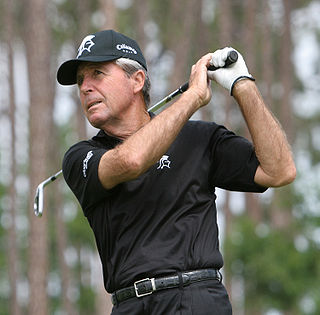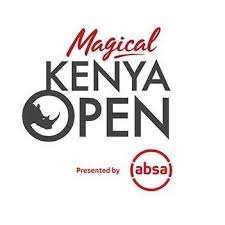
Gary Jim Player DMS, OIG is a South African retired professional golfer who is widely considered to be one of the greatest golfers of all time. During his career, Player won nine major championships on the regular tour and nine major championships on the Champions Tour. At the age of 29, Player won the 1965 U.S. Open and became the only non-American to win all four majors in a career, known as the career Grand Slam. At the time, he was the youngest player to do this, though Jack Nicklaus (26) and Tiger Woods (24) subsequently broke this record. Player became only the third golfer in history to win the Career Grand Slam, following Ben Hogan and Gene Sarazen, and only Nicklaus and Woods have performed the feat since. He won over 160 professional tournaments on six continents over seven decades and was inducted into the World Golf Hall of Fame in 1974.

Sir Robert James Charles is a New Zealand professional golfer who won the 1963 Open Championship, the first left-handed player to win a major championship. He won the 1954 New Zealand Open as an 18-year-old amateur and made the cut in the same event in 2007, at the age of 71. His achievements over that period, in which he won 80 tournaments, rank him as one of the most successful New Zealand golfers of all time. He is, along with Michael Campbell, one of only two New Zealanders to win a men's major golf championship.
Neil Chapman Coles, MBE is an English professional golfer. Coles had a successful career in European golf, winning 29 important tournaments between 1956 and 1982. After reaching 50, he won a further 14 important Seniors tournaments between 1985 and 2002, winning his final European Seniors Tour event at the age of 67. He also played in eight Ryder Cup matches between 1961 and 1977.

The Genesis Scottish Open is a professional golf tournament in Scotland, and is one of five tournaments that are part of the Rolex Series, which identifies it as one of the European Tour's premier events. It has been played on various courses, but in recent years it has been played on a links course, appealing to players who wish to gain experience before the Open, which takes place in the following week.
The South African Open is one of the oldest national open golf championships in the world, having first been played in 1903, and is one of the principal tournaments on the Southern-Africa-based Sunshine Tour. Since 1997 it has also been co-sanctioned by the European Tour.
Peter Arthur Oosterhuis is an English professional golfer and golf broadcaster. Oosterhuis played on the European circuit from 1969 to 1974, winning 10 tournaments and taking the Harry Vardon Trophy for heading the Order of Merit for four consecutive seasons from 1971 to 1974. From 1975 he played on the PGA Tour, winning the Canadian Open in 1981. He was twice runner-up in the Open Championship, in 1974 and 1982. Later he became a golf analyst on TV, initially in Europe and then in the United States. In 2015, Oosterhuis announced that he had Alzheimer's disease.
Germán Garrido Cánora is a member of one of Spain's most successful golfing families. His brother Antonio and nephew Ignacio were only the second father-son combination to have played in the Ryder Cup.
Norman David Wood was a Scottish professional golfer. He won the 1972 Italian Open and played in the 1975 Ryder Cup.

The Kenya Open, currently titled as the Magical Kenya Open for sponsorship reasons, is a professional golf tournament in Kenya founded in 1967.
The 1972 European Tour, titled as the 1972 PGA European Tour, was the inaugural season of the European Tour, the main professional golf tour in Europe.
The 1974 European Tour, titled as the 1974 PGA European Tour, was the third season of the European Tour, the main professional golf tour in Europe since its inaugural season in 1972.
The 1975 European Tour, titled as the 1975 PGA Tournament Players' Section, was the fourth season of the European Tour, the main professional golf tour in Europe since its inaugural season in 1972.
The 1978 European Tour, titled as the 1978 PGA European Tournament Players' Division, was the seventh season of the European Tour, the main professional golf tour in Europe since its inaugural season in 1972.
The 1981 European Tour, titled as the 1981 PGA European Golf Tour, was the 10th season of the European Tour, the main professional golf tour in Europe since its inaugural season in 1972.
The 1984 European Tour, titled as the 1984 PGA European Tour, was the 13th season of the European Tour, the main professional golf tour in Europe since its inaugural season in 1972.
The 1985 European Tour, titled as the 1985 PGA European Tour, was the 14th season of the European Tour, the main professional golf tour in Europe since its inaugural season in 1972.
The Rhodesian Dunlop Masters was a golf tournament that was held in Rhodesia. It was an event on the Southern Africa Tour until the late 1970s.
The 1985 Ladies European Tour was a series of golf tournaments for elite female golfers from around the world which took place in 1985. The tournaments were sanctioned by the Ladies European Tour (LET).
The 1982 Ladies European Tour was the fourth season of golf tournaments organised by the Women's Professional Golfers' Association (WPGA), which later became the Ladies European Tour (LET). There were ten tournaments on the schedule including the Women's British Open, organised by the Ladies' Golf Union.
The 1979 Ladies European Tour was the inaugural season of golf tournaments organised by the Women's Professional Golfers' Association (WPGA), which later became the Ladies European Tour (LET). The tour was principally sponsored by Carlsberg, who organised 12 36-hole tournaments counting towards their own Order of Merit. There were six other tournaments on the schedule including the Women's British Open, organised by the Ladies' Golf Union.





